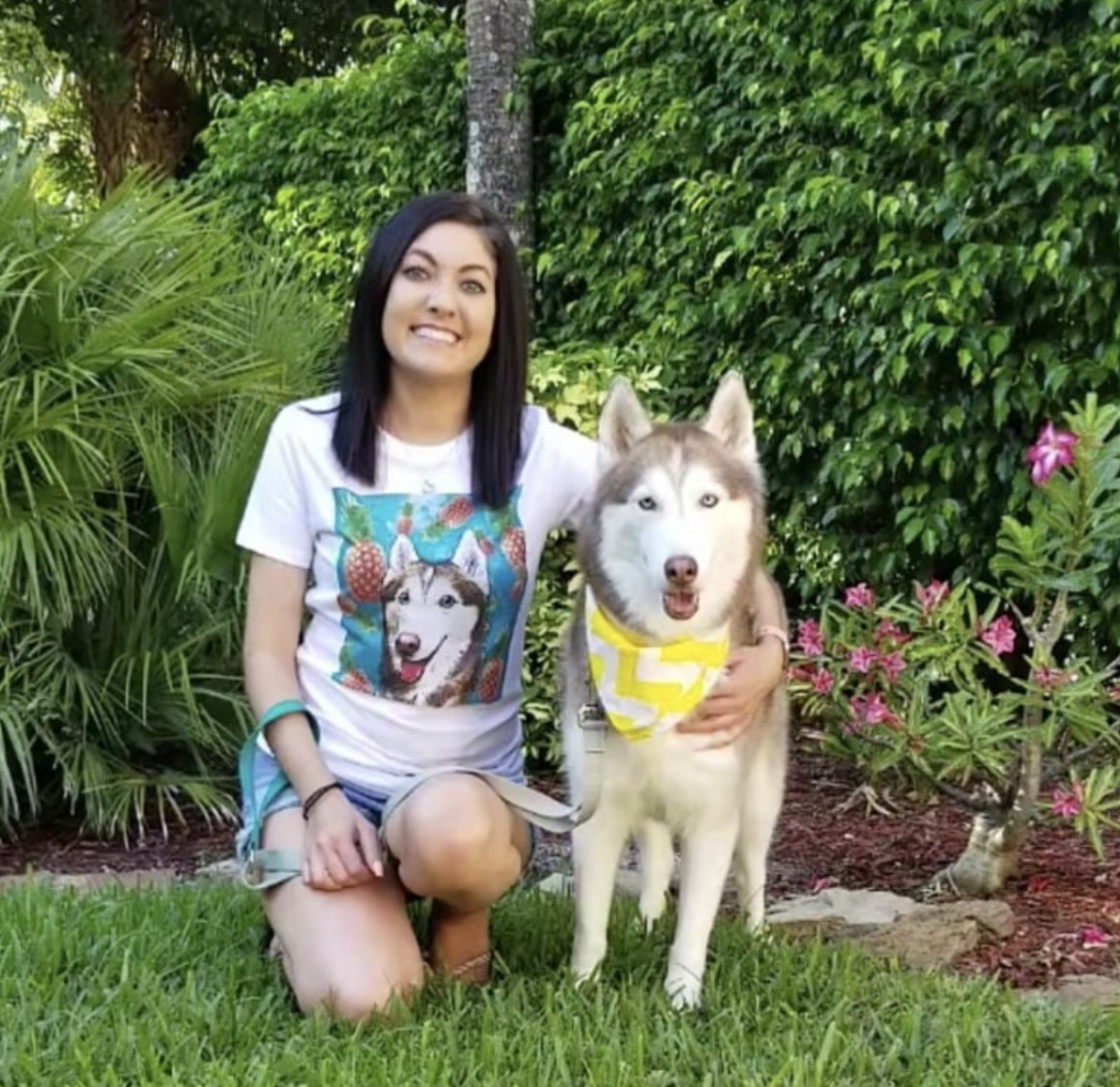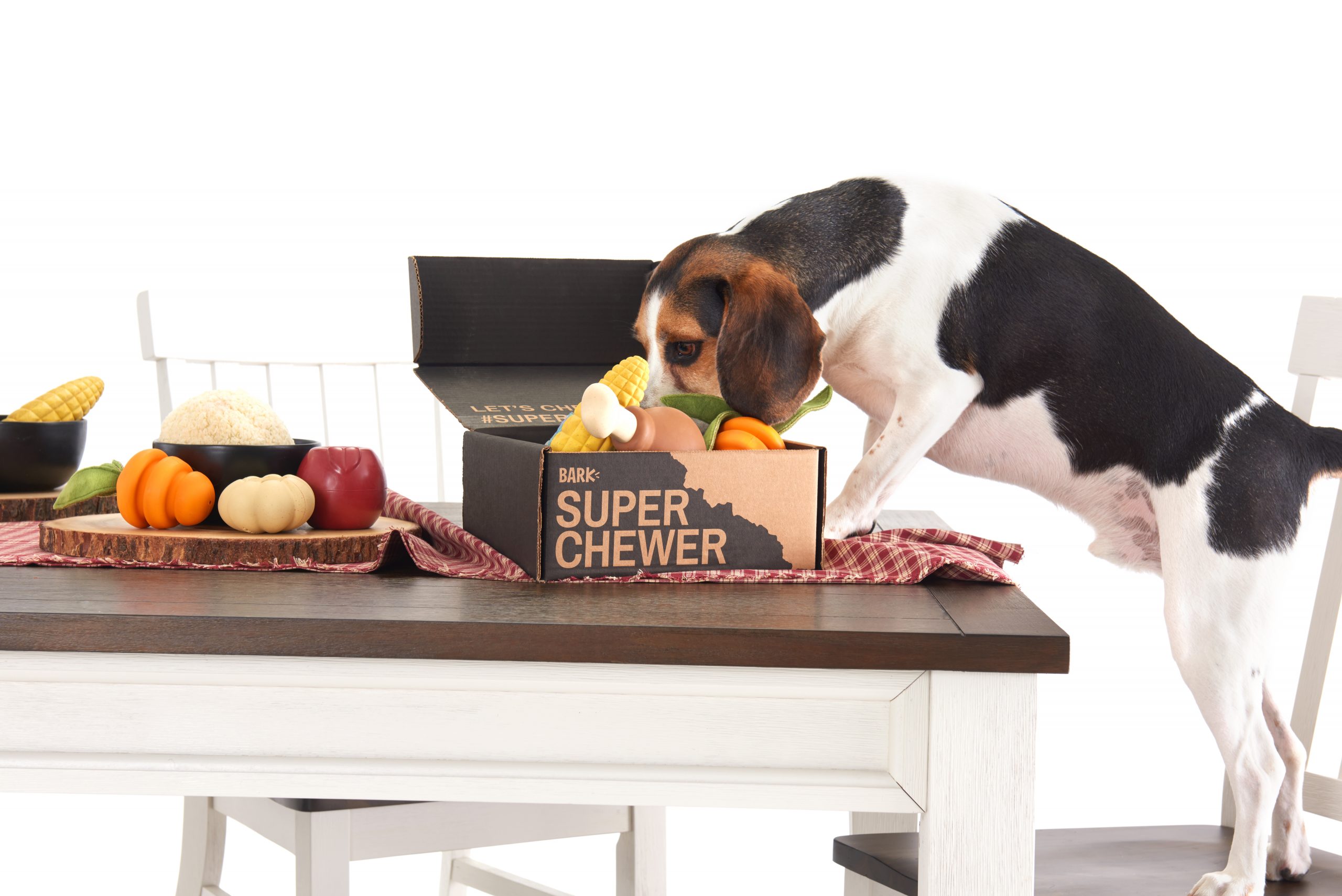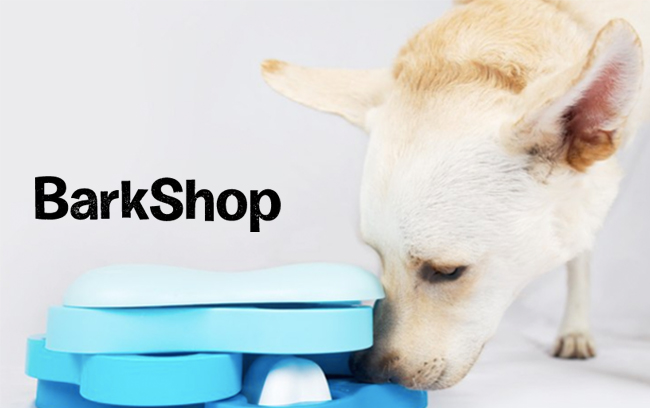For Pups With Short Attention Spans…
Dog will lick their paws for a number of reasons. They could be suffering from skin allergies or parasites. Dogs will lick their foot if it is injured or if there is a hot spot present. Dogs will also lick their paws out of anxiety or boredom. While paw-licking is not inherently a problem, be sure to assess whether the licking is excessive or concentrated on a single paw.
It’s 2:30am and you hear aggressive licking from across the room. Your husband’s asleep, so it’s not him, thankfully. That would be weird. It’s your dog. Again! A thousand paw licks pierce the silence every night. Why are they doing this!? And for the love of dog, how can you get them to stop?!
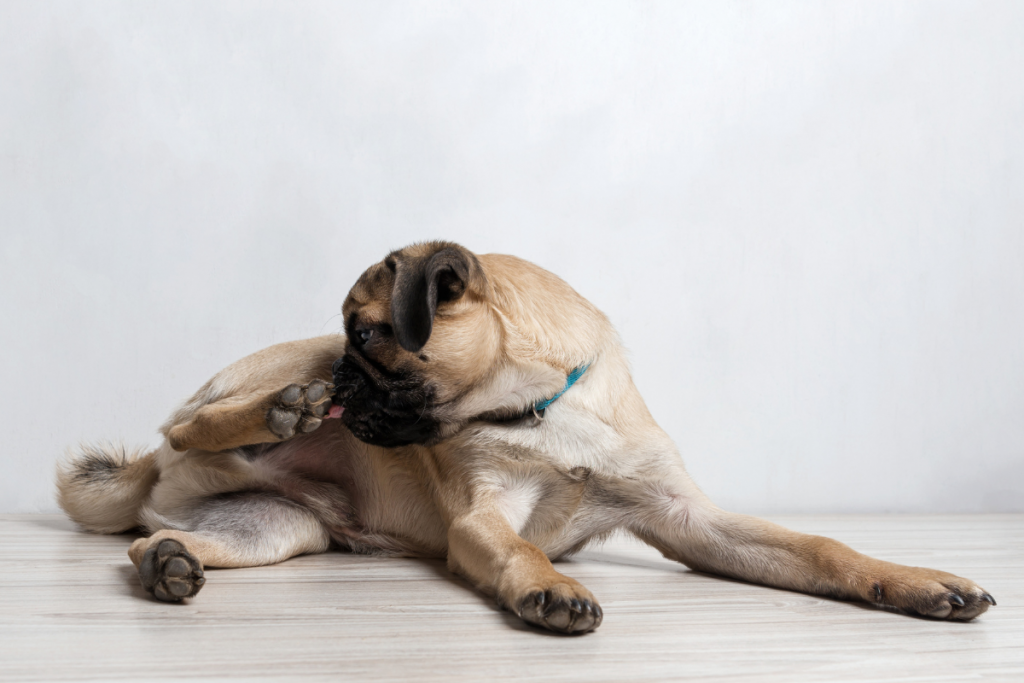


Is Paw Licking Normal?
Yes and no. Occasional paw licking is normal. Your pup might have an itch, or maybe some mystery goober between their toes was too tasty to resist. Paw licking becomes a problem when your dog is constantly nose-to-toes. If your dog is licking their paws, pay attention to these behaviors to help narrow down the cause:
- How Often They’re Licking – Licking constantly is a telltale sign something is bothering them. Chronic licking often causes fur staining, so watch out for paw fur stained brown or red.
- Which Paw(s) They’re Licking – Licking only one paw could be a sign your pup injured their foot, or that something is stuck between their paw pads. On the other hand—or in this case “other paw”—licking both paws may be a sign your pup has a different underlying problem, like allergies or anxiety.
- Whether They’re Licking The Top Of Their Foot Or Their Paw Pads – If your dog is licking their paw pads, they might have injured them during a walk from hot pavement, salted sidewalks, or stepping on something sharp. They may also have something stuck between the pads, like a thorn, pebble, or snow chunk. If they’re licking the top of their foot, it’s more likely you can rule out a paw-pad injury.
- They’re Showing Additional New Symptoms – Pay attention to any other new symptoms your dog is exhibiting. Are they licking other body parts, too? Are they limping? Has anything in their diet, routine, or behavior changed?
Why Is My Dog Licking Their Paws?
There are a surprisingly large number of issues that could be behind your dog’s licking habits. Below are some of the most usual suspects.
Environmental Allergens And Irritants


Dogs can have outdoor allergies just like we do. Their skin and little toe beans might be getting irritated from certain grasses, weeds, or lawn treatments during your daily walkies. Pay attention to where you’re taking your daily walks, and where your dog is playing outside. You may need to take a new walking route to avoid certain grasses, or wipe their paws after you get home. Ask yourself these questions:
- Does your dog lick their paws more often after a walk or playing outside?
- Does your dog lick their paws more often in Spring or Fall?
- Did you recently treat your yard with fertilizer or pesticides?
- Is there a certain field or park that seems to irritate them more?
- Have you recently moved to a different neighborhood or region that might have different grasses and weeds?
Food Allergies
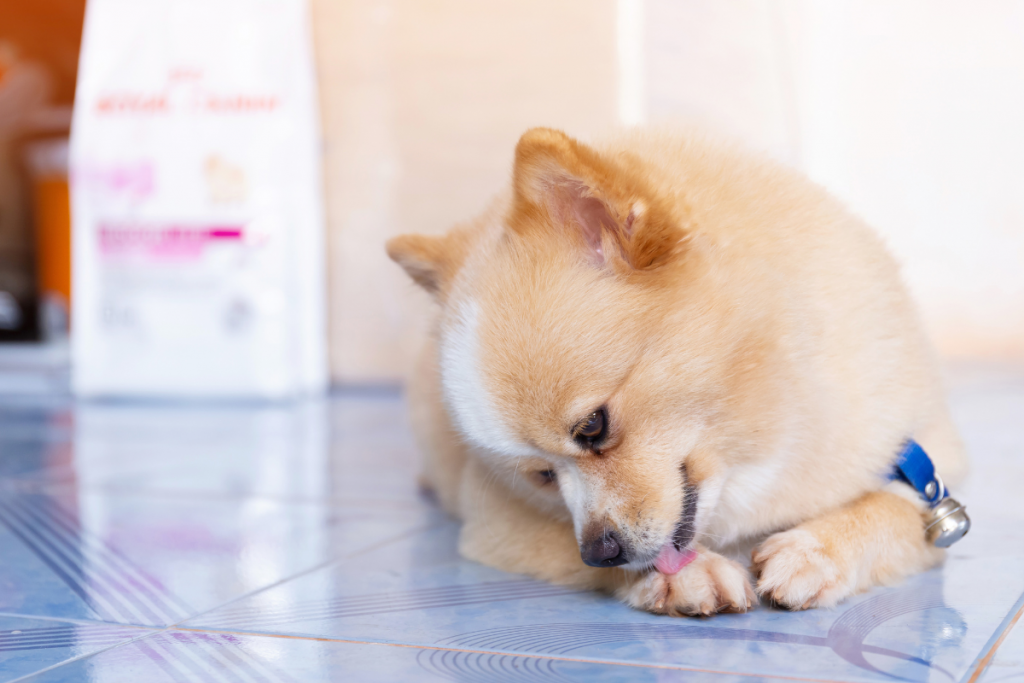

Food allergies, which activate your dog’s immune system, are actually pretty rare, but they do happen. This is different than food intolerance, which is much more common. They can both cause a ruckus in your dog’s body (e.g. explosive poops, vomiting, etc…). The key difference is that immune system response. If your dog does happen to be an unlucky lottery winner of a food allergy, it could be causing skin issues and itchies. Licking their paws can be your dog’s way of trying to soothe their irritated skin. It’s also likely you’ll notice them licking, scratching, or chewing other areas of their body.
Food allergies can be hard to pinpoint. Start by asking yourself the questions below and talk to your vet about your concerns. They can help you narrow down the allergy, then decide if your dog should switch to a novel protein diet, limited ingredient diet, or prescription food.
- Have you changed your dog’s diet recently?
- Are they licking, scratching, or chewing other areas, too?
- Do they go dumpster diving in the kitchen trash often?
Related Article: Does My Dog Have A Food Allergy?
Parasites
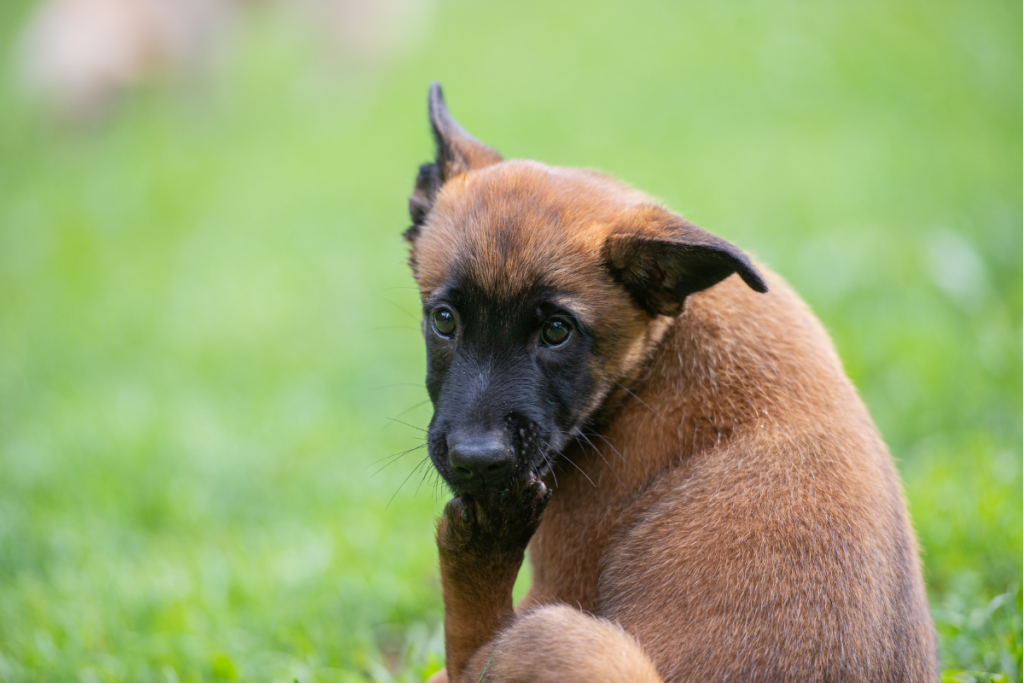

Creepy crawlies would make anyone’s skin itch! Parasites—like fleas, ticks, and mange-causing mites—can irritate your pup’s skin. Fleas or mange will likely cause your dog to lick and scratch all over their body—not just their paws. When it comes to ticks, the bite itself won’t usually make your dog immediately itchy. In rare cases, however, the chemicals in tick saliva can create an allergic reaction. Keep your dog on monthly flea/tick prevention, check their body after walks in woods, and visit your vet if you think your dog might have mange.
- Comb through your dog’s forest of fur, and check between their paw pads for fleas or ticks. They’ll look like little black or brown specs.
- Check your dog’s skin for scabs, lesions, redness, or hair loss. This could be a sign of mange.
- Is your dog licking, biting, or scratching other areas of their body?
- Has your dog recently been at a pet hotel, day care, or did you just adopt them from a shelter? Dogs are more likely to pick up a parasite from another furry friend in these busy places.
Related Article: What Are the Symptoms of Mange In Dogs?
Injuries Or Pain
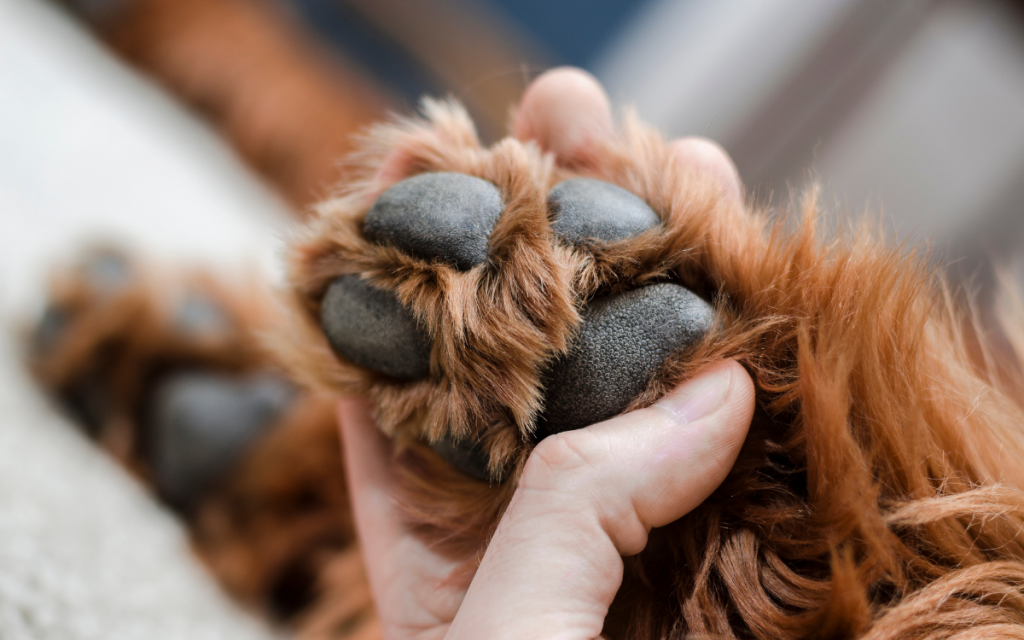

If you notice your dog start paw-licking suddenly, or see them licking one paw in particular, it might be because something is hurting them. Some easy-to-fix culprits could be thorns, burs, pebbles, or snowball chunks stuck in between their paw pads or toes. Less visible injuries could be from walking on salted roads or hot sidewalks, stepping on something sharp, bee stings, or blisters. Also make sure to check for broken or torn nails. In more serious cases, dogs will also lick their paws from painful injuries like a sprained leg—like if they jumped off the couch wrong while you were at work.
- Is your dog only licking one foot?
- Are they limping or favoring one foot?
- Did your dog suddenly start licking after a walk? Check for visible injuries or something stuck in their pads.
- Were you walking in snow, on salted roads, hot sidewalks, or wooded areas?
Arthritis
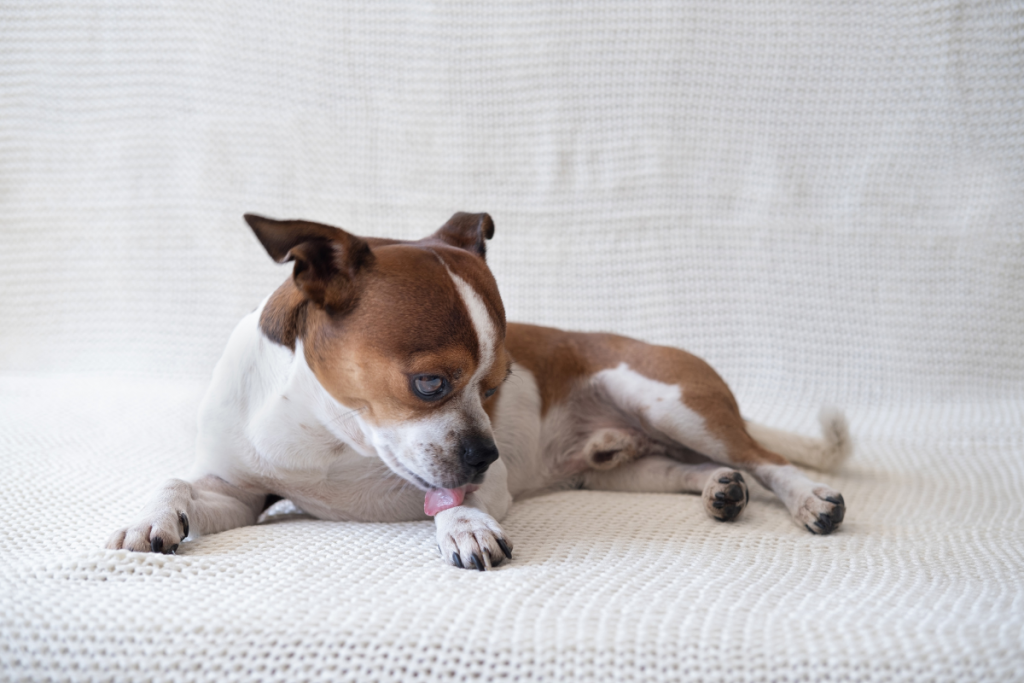

You can’t see your dog’s arthritis pain, but that doesn’t mean they don’t feel it! Licking tends to be your dog’s natural reaction to pain. If your pup is getting up there in age, or you have a breed prone to joint issues, all the licking might be from achey bones and joints! Even when the pain is radiating from somewhere else in their body, paw-licking is often the go-to dog medicine.
- Does your dog limp, avoid jumping, hop up stairs, or have trouble standing after laying down?
- Do you have a senior dog or a breed prone to joint issues?
- Does your dog pace around at night? This can be a sign of arthritis.
- Have they already been diagnosed with arthritis? Talk to your vet about pain management, supplements, or anti-inflammatories.
Dermatitis Or Hot Spots
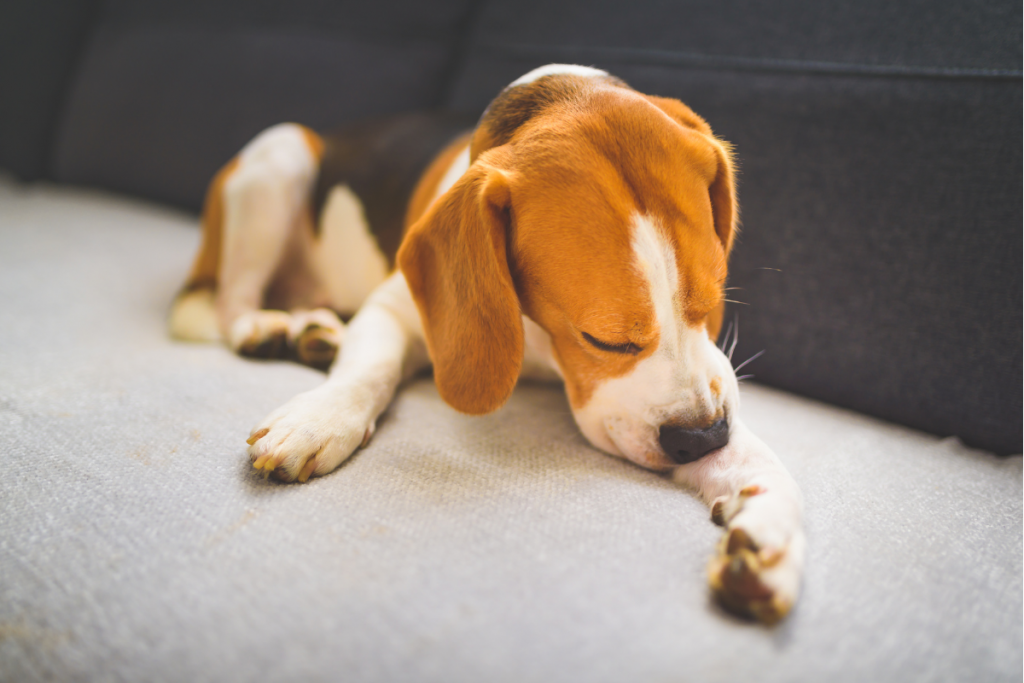

Dermatitis just means “skin irritation,” and can be caused by a lot of different skin issues, like bacterial infections, yeast infections, allergies, and skin irritants, such as lawn treatments and household chemicals. Depending on what’s causing your pup’s dermatitis, they may be itchy all over their body, or it may be localized to certain areas. Sometimes this can create “hot spots”. This is a type of dermatitis that causes moist spots of red, inflamed, and possibly oozing skin. Certain breeds with thicker coats—like golden retrievers, huskies, and others—can be prone to hot spots, especially in humid weather or if their coat isn’t thoroughly dried after being in water.
- Is your dog’s skin red, inflamed, moist, or oozing?
- Do you have a dog with a thicker coat that’s prone to hot spots?
- Has the weather been hot and humid lately?
Anxiety/Stress



Those of you who pick your nails or crack your knuckles when you’re stressed can probably relate to dogs with a nervous licking problem. Your dog might be licking their paws while they’re impatiently waiting for you to get home from work. Other dogs might lick their paws when they feel stressed during thunderstorms, fireworks, or other anxiety-inducing events. If you only notice paw licking during certain situations, it’s a good idea to talk to a behavior specialist or discuss calming aid options with your vet.
- Does your dog lick their paws during stressful events? Thunderstorms, fireworks, vet visits, house guests, etc. might be stressful.
- Do you notice your dog’s paws are damp from licking only when you’ve been at work or gone for awhile?
Boredom


Dogs often lick their paws out of boredom. It’s a sign that your pup needs more exercise or mental stimulation throughout their day. This is especially common with high energy breeds like border collies, Australian shepherds, and huskies. Try adding extra walks, playdates at the park, or some puzzle treat toys into their daily routine to keep them preoccupied.
- Do you have a high energy breed?
- Is your dog getting enough exercise?
- Has your dog gotten enough attention and mental stimulation?
Related Article: Best Interactive Dog Toys Of 2022
Secondary Infection
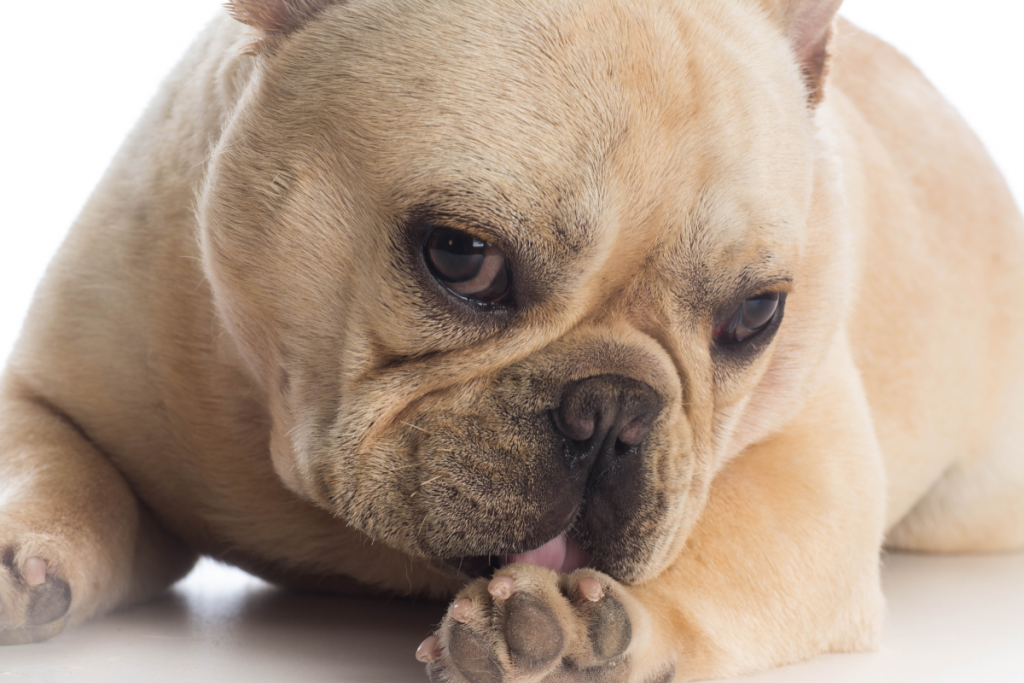

If your dog has already been licking away at their paws for a while, it can eventually create a secondary infection from the licking itself. The continued licking will begin to irritate the skin, possibly breaking the skin, and introducing bacteria from your pup’s gritty mouth–which leads to more licking.
If you can tell your dog’s licking addiction is heading this direction, it is definitely time for a vet visit to diagnose the underlying cause. Until your visit, consider keeping a cone on them to prevent more licking (socks and wraps can be counterproductive by trapping moisture which can further infections). If the problem is already out of control and their skin is looking inflamed or infected, get to the vet ASAP. The problem will only get worse if it’s not treated.
- Has your dog been licking their paws for a while?
- Is the skin irritated, red, swollen, bleeding, or oozing?
How Do You Stop Your Dog From Licking Their Paws?
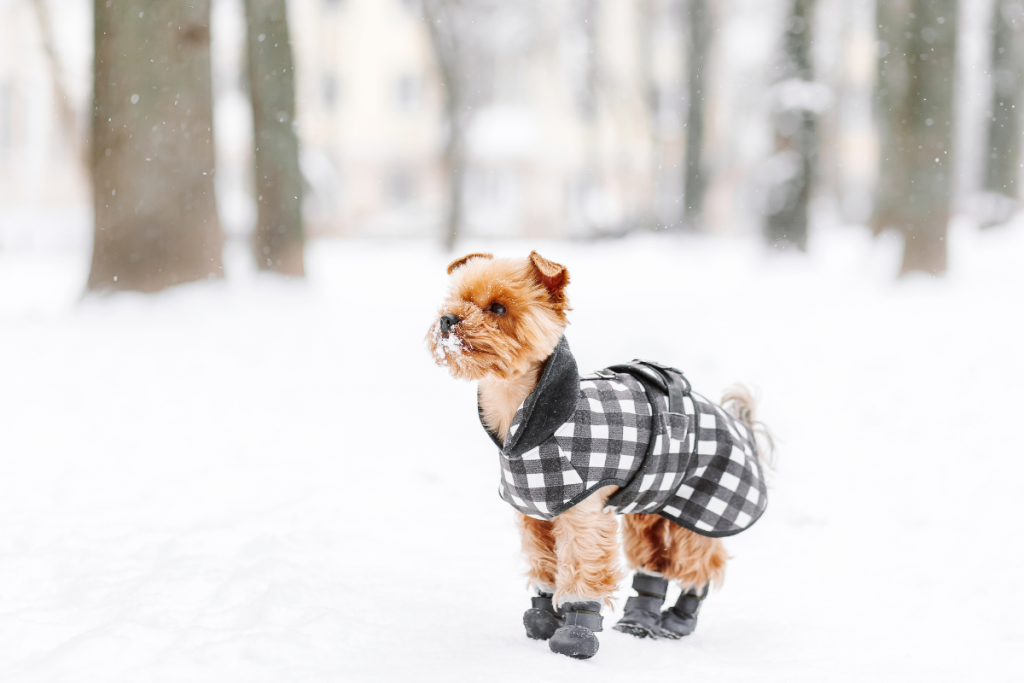

If you keep catching your pup going to town on their toes, you’ll need to figure out what’s causing all the licking. Start by checking for any visible injuries, skin irritation, parasites, or debris stuck in between their paw pads or toes. Some of these issues can be a quick fix to immediately stop the licking.
If nothing is noticeably wrong with their foot or paw pads, you’ll want to consult with your vet about next diagnostic steps and how to manage the licking at home (an e-collar can prevent licking until you talk to your vet – this is better than doing anything to the feet directly. You can sometimes make things worse despite best intentions – especially if you don’t know what the root cause is).
- Check For Obvious Injuries Or Debris – Look in between your dog’s paw pads and toes for thorns, burs, ticks, snow chunks, irritated skin, cuts, cracked nails etc.. Remove any debris and treat small injuries.
- Visit The Vet To Treat Larger Injuries Or Skin Infections – If your pup has a larger paw injury or you just can’t tell what’s wrong, you’re going to need to schedule a vet visit. They can help you with the right treatment for things like a gnarly slice on their paw, skin infections getting out of control, or any sprained or broken bones.
- Prevent Them From Doing More Licking – If your dog continues licking, it can eventually lead to skin irritations and infections. If you’re still working on figuring out why your pup is licking, or you’re in the middle of treatment, you need to find solutions to stop the licking in the meantime. An e-collar is your best bet. Wrapping the foot can make some things (like burgeoning skin infections) worse by trapping moisture, and wraps that are too tight can cut off blood flow. Applying topical treatments (like bitter spray) can exacerbate some skin irritations, or hurt if the skin is raw.
- Watch For Additional Symptoms – Pay attention to other symptoms your dog is showing. Noticing if they’re licking one paw or multiple paws, limping, scratching, stressed, etc. can help you narrow down the problem.
- Make Lifestyle Changes – If you think your dog has environmental allergies or food allergies, you might need to consider changing their diet, taking different walking routes, or removing any environmental allergens.
- Groom Them Regularly – Make sure your dog’s toenails are trimmed to avoid splitting, cracking, or pain from growing too long. Brush debris out of their fur, and keep an eye out for fleas, ticks, or other problem parasites. Make sure they are on an appropriate parasite control regimen for your region and time of year.
- Protect Their Feet – If your dog’s feet are getting irritated from hot asphalt, salted roads, or itchy grass, consider buying them some dog boots/socks or wiping down their feet after walks. Make sure to avoid hot asphalt by walking in the grass, or walking in the early morning or evening. In the winter, salted roads and sidewalks can burn your dog’s feet. Try walking in the snow or slip on the doggie boots. You might also want to try treating their paw pads with moisturizing balms.
- Make Sure Your Dog Is Getting Enough Exercise – If you have a high energy breed, or your dog seems bored, try adding more walks or playdates into their schedule. When the weather isn’t ideal, treat puzzles are a great way to keep your dog preoccupied.
- Talk To Your Vet About Joint Supplements Or Pain Management – If your dog is suffering from arthritis, your vet can help you create a treatment plan to address your pup’s pain.
This article has been reviewed by Margo Hennet, DVM.
Margo Hennet, DVM, cVMA, and veterinarian at BARK is a canine nutrition, health, & wellness connoisseur. She has a combined 10 years of experience in clinical medicine, research, and education—that’s 70 dog years of know-how—and graduated from Colorado State University as a Doctor of Veterinary Medicine. She completed specialized training in internal medicine prior to working as a general practitioner in Colorado, has authored peer-reviewed publications and textbook chapters, holds certification in veterinary medical acupuncture, and is a member of the American Academy of Veterinary Nutrition and American Veterinary Medical Association.

